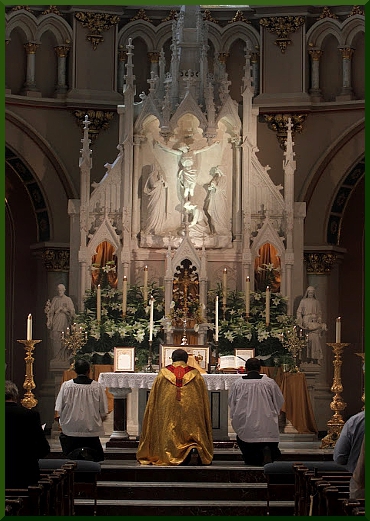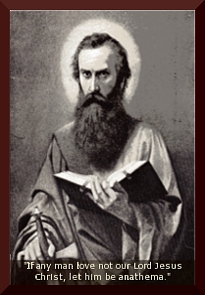h/t to Tradition in Action. (No part of the Latin version of the motu proprio indicates that the Pope envisaged an “active” role for the congregation.)
The information they provided on the subject sparked my interested because I have had an instinctive aversion to “dialogue” Masses. But, I didn’t take their word for it. I actually looked up the Latin, and not just the one they provided on their web page.
It is true! St. Piux X did not ask for “active participation” in the Mass! In his Latin Motu Propio, the word he used, “participatio” merely has the same meaning as “taking part”, or “assisting” as when we say, that we “assist” at Mass.
 The phrase “active participation” first appeared in the Italian language of Saint Pius X’s Motu Proprio Tra le sollicitudini. However, the word “active” is not to be found in the Latin. If read as it stands, and further substantiated by context, the passage cited to encourage dialogue Masses does not even hint that the faithful make vocal responses:
The phrase “active participation” first appeared in the Italian language of Saint Pius X’s Motu Proprio Tra le sollicitudini. However, the word “active” is not to be found in the Latin. If read as it stands, and further substantiated by context, the passage cited to encourage dialogue Masses does not even hint that the faithful make vocal responses:
“Filled as We are with a most ardent desire to see the true Christian spirit flourish in every respect and be preserved by all the faithful, We deem it necessary to provide before anything else for the sanctity and dignity of the temple, in which the faithful assemble for no other object than that of acquiring this spirit from its foremost and indispensable fountain which is participation in the most Holy Mysteries and in the public and solemn prayer of the Church.”
St. Pius is saying that the faithful can acquire the “true Christian spirit” by assisting in the Church’s liturgy in a temple worthy of the worship of God.
Here is the Latin. Notice that there is no “active” modifier for “participatio”:
“Etenim cum nihil Nobis potius sit et vehementer optemus ut virtus christianae religionis floreat et in omnibus Christifidelibus firmior sit, templi decori provideatur oportet, ubi Christicolae congregantur ut hoc virtutis spiritu ex priore fonte fruantur, quae est participatio divinorum mysteriorum atque Ecclesiae communium et solemnium precum.”
So, please, don’t feel compelled to make responses at the TLM! Much can be said about silence being the better part for the laity – as in the demeanor and comportment of our Lady who took it all in, in the silence of her Heart. Really, it is the best way to raise the heart to God when one does not have to “work” at it!
The articles on Tradition in Action are worth your time, so if you want to educate yourself, please read. Here is one gem which should whet the appetite for more on the subject:
“There is, thus, no reference to or recommendation of congregational singing, which, if it took place at some times and in some places, was never an established and universal custom of the Roman rite. So, it could not have been designated as part of the mos maiorum.”
The link to the Latin Motu Propio, Tra le sollicitudini is here. See page 388.



